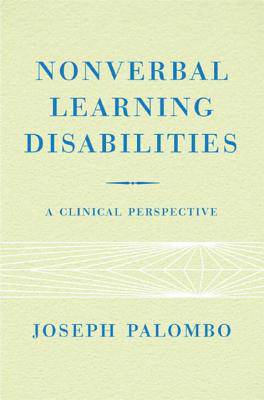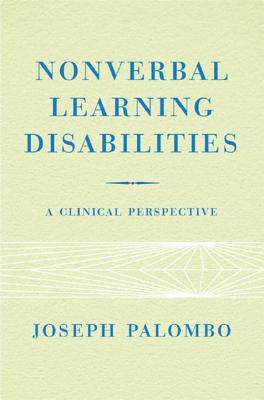
- Retrait gratuit dans votre magasin Club
- 7.000.000 titres dans notre catalogue
- Payer en toute sécurité
- Toujours un magasin près de chez vous
- Retrait gratuit dans votre magasin Club
- 7.000.0000 titres dans notre catalogue
- Payer en toute sécurité
- Toujours un magasin près de chez vous
Description
A nonverbal learning disability (NLD) is a developmental disorder that impairs a person's capacity to perceive, express, and understand nonverbal (nonlinguistic) signs. The dysfunctions affect behaviors, social interactions, perceptions and feelings regarding oneself and others, and emerging personality patterns. NLD constrains an individual's capacity to function in a wide variety of domains, including the academic, social, emotional, and vocational. Parents and clinicians often have difficulty understanding and helping children and adolescents who are simultaneously cherished and whose functioning is hampered by the condition. Based on current neurobehavioral research, this book brings together perspectives drawn from the three major domains of knowledge about NLD neurobehavioral, social, and intrapersonal. From the neurobehavioral perspective, Palombo provides a research-based phenomenological description of the NLD child's symptoms. From the social perspective, he presents the child's social context and how that contributes (in positive and negative ways) to the child's skills and deficits. From the intrapersonal perspective, he introduces the concept of mindsharing as basic to understand the development of the sense of self in children with NLD. In Part I, readers are introduced to NLD as it presents in the clinic with a review of the etiology and symptomatology of the syndrome reflected in a case study. The author then goes on to describe the neurobehavioral profile of NLD (including its psychological and social dimensions). In Part II the social perspective and intrapersonal aspect of NLD are considered. Palombo describes the impact of the syndrome on social functioning, social communication, and emotional functioning. At the close of this part, readers find a clear articulation of the four NLD subtypes. The intrapersonal area is addressed in Part III where Palombo presents the concept of mindsharing i.e., the ability of one person to both know and feel what another person is experiencing. Because they lack a capacity for mindsharing, children and adolescents affected by the syndrome often fail not only a social and emotional connection with others but also experience a lack of cohesion in their own sense of self. Finally, in Part IV, Palombo presents a therapeutic approach to working with youth with NLD. Drawing together the various clinical insights from earlier in the book, these last chapters synthesize the material and highlight the most important aspects so as to best guide the treatment of children and adolescents. Addressed to clinicians, psychiatrists, psychologists, clinical social workers, and other psychotherapists, this book is a fund of knowledge and clinical wisdom for working with youth with NLD. It offers an overarching paradigm relevant to all professionals and parents alike as they care for effected children and adolescents."
Spécifications
Parties prenantes
- Auteur(s) :
- Editeur:
Contenu
- Nombre de pages :
- 342
- Langue:
- Anglais
- Collection :
Caractéristiques
- EAN:
- 9780393704785
- Date de parution :
- 01-03-06
- Format:
- Livre broché
- Format numérique:
- Trade paperback (VS)
- Dimensions :
- 154 mm x 234 mm
- Poids :
- 494 g

Les avis
Nous publions uniquement les avis qui respectent les conditions requises. Consultez nos conditions pour les avis.






